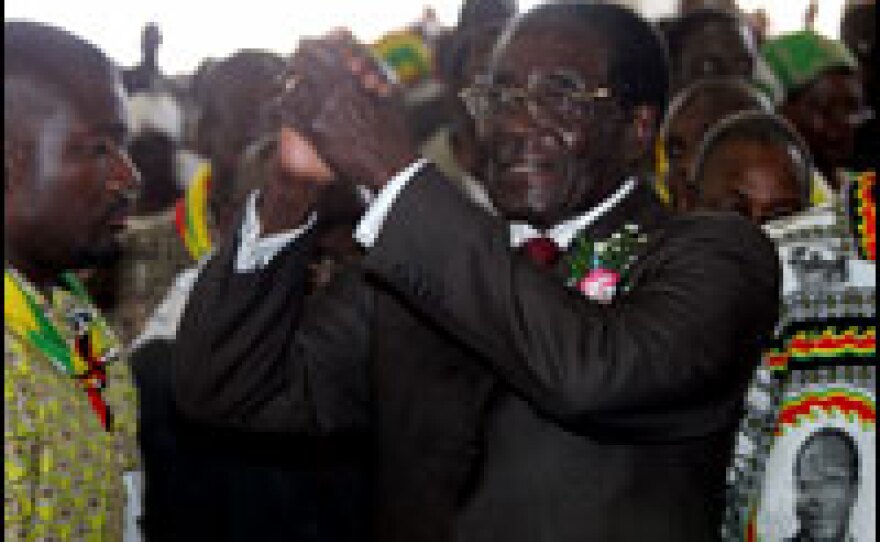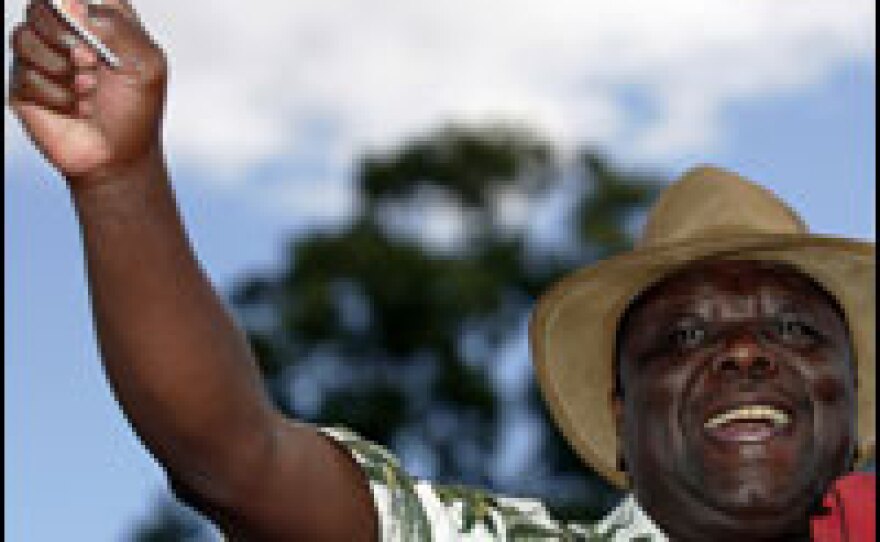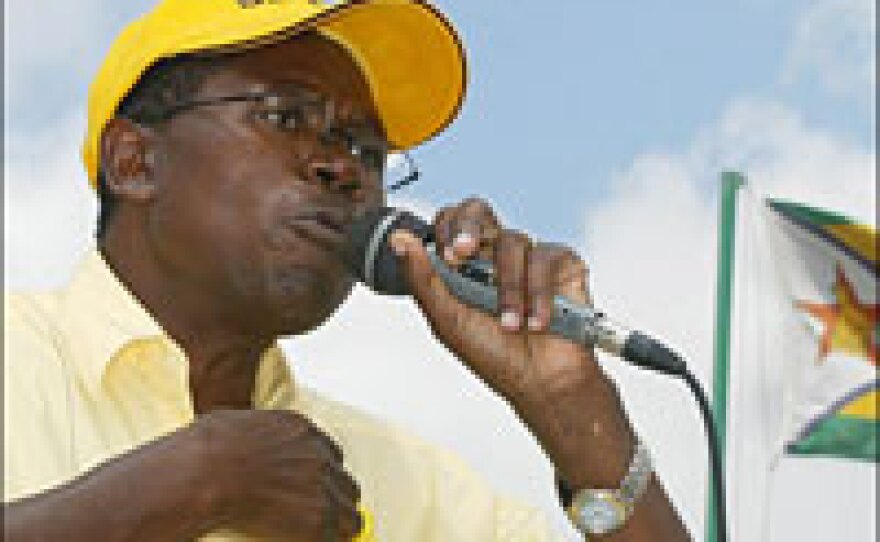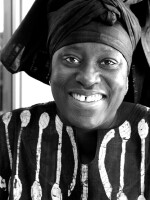

The southern African nation of Zimbabwe has had only one leader since escaping white minority rule 28 years ago: Robert Mugabe. The 84-year-old is bidding for a sixth presidential term in Saturday's vote, but he is facing his toughest electoral challenge yet from two serious presidential contenders.
The main opposition leader, Morgan Tsvangirai, 55, of the Movement for Democratic Change, is Mugabe's long-term political rival and has twice opposed him in presidential votes. The image of Tsvangirai's bruised face — following a beating by Mugabe's police in a crackdown on the opposition — made news all over the world last year.
The latest challenge to Mugabe comes from his erstwhile finance minister and fellow Zanu-PF party member, Simba Makoni, 58. Makoni is running for president on an independent ticket.
Mugabe has dismissed Makoni as a political prostitute and Tsvangirai as a puppet of Western imperialism, led by the country's former colonial power, Britain. But Mugabe's critics and political opponents say it is time for the veteran leader to go. He has vowed that the opposition "will never, ever, ever" come to power during his lifetime.
Once a popular freedom fighter who led Zimbabwe out of a seven-year liberation war against white minority rule in Rhodesia, Mugabe has become an international pariah in the past decade.
One blot on his liberation struggle credentials was the ruthless subjugation of the minority Ndebele tribe, after a smaller liberation movement refused to form a one-party state with Mugabe's Zanu-PF in the 1980s. Mugabe unleashed his notorious North Korean-trained Fifth Brigade, dominated by his own majority Shona tribe, on Matebeleland, where 30,000 people were killed and thousands more raped and maimed.
Critics say the crackdown was a sign of things to come.
Since the early 1980s, when Mugabe was praised for promoting racial harmony and reconciliation, economic prosperity and stability, Zimbabwe also has been transformed into a near economic wreck.
In a bitter war of words, Mugabe has blamed Britain and its Western allies for imposing sanctions and has accused them of colluding with the opposition to bring Zimbabwe to its knees.
"The West still negates our sovereignties, by way of control of our resources, in the process making us mere chattels in our own lands, mere minders of these transnational interests," Mugabe said. "In my own country and other sister states in southern Africa, the most visible form of this colonial control has been over land — despoiled from us at the onset of British colonization."
But Mugabe's detractors hold him personally responsible for the economic chaos, accusing him of ruinous policies, notably a controversial land reform program that he imposed on Zimbabwe in the past 10 years.
An Economic Slide
After a defeat almost a decade ago in a referendum that Mugabe hoped would entrench his hold on power, his government began seizing, often violently, viable, white-owned commercial farms that were the backbone of the Zimbabwean economy.
The appropriation of white farms, or farm "invasions," as they came to be known, led to some killings and also meant the loss of jobs and homes for thousands of black Zimbabwean farm laborers.
Mugabe's justification for his ambitious land restitution agenda was that just 5,000 white farmers owned 80 percent of Zimbabwe's most productive agricultural land. He said this colonial legacy had to be reversed.
Britain's program to right this inequality after independence, on a willing seller-willing buyer basis, came to an abrupt end when it was found that most of the best land was not going to landless black Zimbabweans, as Mugabe promised, but to the elite and his cronies. Mugabe accused the British of reneging on their commitment.
For many people, this period marked the beginning of Zimbabwe's tragic slide.
A country that exported food to its neighbors in southern African now imports essential commodities and accepts international food handouts. The economy is all but propped up by remittances from millions of exiled Zimbabweans — a third of the population — sending money back home to support their families and friends.
The struggle to survive — with staggering inflation running at more than 100,000 percent, the highest rate in the world — has left poor Zimbabweans even poorer. Many live hand-to-mouth, dealing with chronic shortages of food, fuel, water and other essentials.
Anecdotes abound about how shoppers enter supermarkets only to find that, by the time they reach checkout, prices for their groceries have gone up — maybe twice.
Even the cost of a soda is counted in millions of Zimbabwean dollars.
Concerns About Election
The economic crisis is not the only problem in Zimbabwe. As almost 6 million voters prepare to choose their new leaders on Saturday, there have been allegations of pre-election irregularities and a vote skewed in favor of Mugabe and Zanu-PF.
A report released by New York-based Human Rights Watch last week concluded that there was little chance of proper elections in Zimbabwe. The advocacy group said the government had failed to meet its democratic obligations, and that Zimbabweans were not free to vote for candidates of their choice.
"We have documented numerous abuses, including incidents of political intimidation and violence, limits on the right to freedom of association and assembly, biased media access — in terms of political coverage over the campaigning period --numerous flaws in the electoral process, which preclude the possibility of a fair and free election taking place in Zimbabwe," researcher Tiseke Kasambala said.
Washington also has voiced concerns that Zimbabwe will not hold a transparent vote. State Department spokesman Sean McCormack said the documented irregularities endangered the vote. He urged Mugabe and Zimbabwe's electoral commission to address what he called shortcomings.
Mugabe's government dismissed the Human Rights Watch report as merely a reflection of what Western countries wanted to hear about Zimbabwe, and not the reality.
Promises of Change
During a weekend campaign rally, Tsvangirai, the opposition leader, also raised concerns about an unfair election. He pointed the finger at Mugabe's government.
To loud applause and chants of "A new Zimbabwe, a new beginning," he told a throng of supporters, "The goal is in sight and we expect the enemies of justice to engage in every trick in the book."
Tsvangirai said Zimbabweans would be witnessing "the last gasp of the dictatorship come the elections on March 29." He said voters were "ready for those that would like to subvert the people's victory. We are ready for those that would like to engage in nefarious activities to subvert the will of Zimbabweans."
Tsvangirai has described the other challenger, Makoni, who entered the race for the presidency at the 11th hour, as "old wine in a new bottle" because of his long association with Mugabe and Zanu-PF. But the former finance minister's dramatic last-minute defection from the governing party is an indication of dissent within Mugabe's ranks.
Makoni said he represented change for Zimbabwe.
"I share the agony and anguish of all citizens over the extreme hardships that we have all endured for nearly 10 years now, in this sad nation which is full of fear, a nation in deep stress," he said.
He called Zimbabwe a "tense and polarized nation," and said he shared "the widely held view that these hardships are a result of failure of national leadership."
The challenges facing Zimbabwe are formidable. But Mugabe appears determined to thwart all attempts to oust him through the ballot.
Copyright 2022 NPR. To see more, visit https://www.npr.org. 9(MDAzMjM2NDYzMDEyMzc1Njk5NjAxNzY3OQ001))







